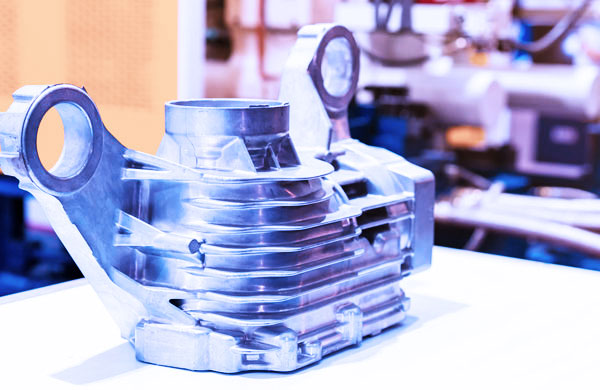Stahl Specialty Company Fundamentals Explained
Stahl Specialty Company Fundamentals Explained
Blog Article
Some Known Questions About Stahl Specialty Company.
Table of ContentsHow Stahl Specialty Company can Save You Time, Stress, and Money.8 Easy Facts About Stahl Specialty Company ShownThe Greatest Guide To Stahl Specialty CompanyThe 9-Minute Rule for Stahl Specialty Company5 Easy Facts About Stahl Specialty Company Described
The refined distinction depends on the chemical material. Chemical Comparison of Cast Light weight aluminum Alloys Silicon promotes castability by minimizing the alloy's melting temperature level and improving fluidness during casting. It plays a critical role in enabling detailed molds to be filled up properly. Furthermore, silicon adds to the alloy's strength and use resistance, making it important in applications where durability is essential, such as vehicle parts and engine elements.It also enhances the machinability of the alloy, making it much easier to refine into ended up items. In this way, iron adds to the general workability of light weight aluminum alloys.
Manganese adds to the strength of light weight aluminum alloys and boosts workability. It is typically made use of in functioned light weight aluminum items like sheets, extrusions, and profiles. The visibility of manganese help in the alloy's formability and resistance to splitting throughout manufacture processes. Magnesium is a lightweight component that provides stamina and influence resistance to light weight aluminum alloys.
Zinc improves the castability of light weight aluminum alloys and aids regulate the solidification procedure during spreading. It boosts the alloy's toughness and solidity.
5 Simple Techniques For Stahl Specialty Company
Due to the fact that aluminum-silicon alloys have great casting properties, high gas homes, simple procedures, and exceptional corrosion resistance, aluminum-silicon alloys are most commonly used in the die-casting market at home and abroad. At the very same time, aluminum-silicon alloys are also reasonably very early and commonly identified alloys developed and made use of in die-casting. After constant research study and renovation, most of the current global mainstream aluminum-silicon alloys have actually been finalized and are nothing even more than A356, A360, A380, ADC12, B390, and A413.
The primary thermal conductivity, tensile strength, return stamina, and elongation differ. Select ideal resources according to the efficiency of the target product created. Among the above alloys, A356 has the highest thermal conductivity, and A380 and ADC12 have the most affordable. The tensile limitation is the contrary. A360 has the very best return stamina and the highest possible elongation rate.

The 9-Minute Rule for Stahl Specialty Company
In accuracy spreading, 6063 is well-suited for applications where detailed geometries and top quality surface area coatings are vital. Instances consist of telecommunication rooms, where the alloy's remarkable formability allows for smooth and visually pleasing styles while keeping structural integrity. Likewise, in the Lights Solutions market, precision-cast 6063 parts create elegant and efficient lighting components that call for intricate forms and excellent thermal performance.
(https://fliphtml5.com/homepage/stahlspecialc)
The A360 exhibits superior elongation, making it excellent for complicated and thin-walled elements. In precision spreading applications, A360 is appropriate for industries such as Customer Electronic Devices, Telecommunication, and Power Tools.

In precision casting, light weight aluminum 413 beams in the Consumer Electronics and Power Equipment industries. It's generally made use of to craft complex elements like mobile phone housings, camera bodies, and power tool cases. Its accuracy is impressive, with limited resistances approximately 0.01 mm, ensuring remarkable product assembly. This alloy's superior deterioration resistance makes it a superb option for exterior applications, making sure lasting, long lasting items in the mentioned sectors.
All about Stahl Specialty Company
When you have decided that the aluminum die casting procedure appropriates for your project, an essential next action is picking one of the most ideal alloy. The light weight aluminum alloy you pick will considerably affect both the casting procedure and the residential properties of the last product. Due to this, you must make your choice meticulously and take an educated technique.
Figuring out the most suitable light weight aluminum alloy for your application will mean evaluating a broad variety of features. The very first category addresses alloy qualities that influence the manufacturing procedure.
The alloy you select for die spreading directly affects several elements of the spreading procedure, like exactly how easy the alloy is to collaborate with and if it is vulnerable to casting flaws. Warm fracturing, likewise referred to as solidification splitting, is a regular die casting defect for light weight aluminum alloys that can lead to interior or surface-level rips or cracks.
Some Known Factual Statements About Stahl Specialty Company
Specific aluminum alloys are a lot more susceptible to hot splitting than others, and your option must consider this. One more usual flaw discovered in the die casting of light weight aluminum is die soldering, which is when the cast sticks to the die walls and makes ejection difficult. It can damage both the actors and the die, so you must look for alloys with more tips here high anti-soldering homes.
Corrosion resistance, which is already a significant feature of light weight aluminum, can vary substantially from alloy to alloy and is a necessary characteristic to think about depending upon the ecological conditions your product will be subjected to. Wear resistance is an additional building typically looked for in aluminum items and can set apart some alloys.
Report this page